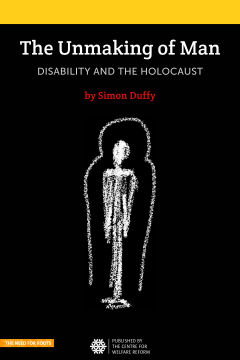Exploring what we can learn from the Holocaust and how it applies to people with disabilities today.
The Unmaking of Man is a series of four essays by Dr Simon Duffy exploring the lessons of the Holocaust for people with disabilities.

Few people know that people with disabilities not only made up a large number of the victims of the Holocaust but they were the first victims, marked out for destruction at a very early stage.
Doctors argued that people with disabilities lived lives not worth living and lobbied Hitler to start a programme of euthanasia. The technologies and approaches then developed were then transferred to the destruction of the Jewish people. Dr Duffy explores the practical and theoretical factors that led to the Holocaust and the common experiences of people with disabilities, the Jews and other victims of the Holocaust.
Dr Duffy uses this analysis to explore the current risks for people with disabilities including the on-going threats of eugenics, segregation, stigmatisation, poverty and rightlessness. He also explores the strategies necessary to defend people at a time of growing economic insecurity.
The Unmaking of Man does not offer all the answers to that question. However it does cast some light on some of the darker parts of human history, and for me it is where much of my own thinking began. Reflecting on the Holocaust - its horror and its causes - has been helpful in clarifying what it is we need to fight against and what is worth fighting for.
In his Foreword to the book John O'Brien writes:
Many people have benefited from Simon’s gift for designing straightforward approaches to reforming the delivery of publicly funded supports and providing clear and memorable reasons for implementing them. These essays, written in 1995 and edited for release as the first in the Centre for Welfare Reform’s The Need For Roots series, provide an essential resource to anyone who wants to understand his thinking.
Those working to implement self-direction, those organizing individualised supports with the aid of The Keys to Citizenship, those using the contrast between the Gift Model and the Citizenship Model to criticise and re-shape policy will find an important branch of the root system for these useful ideas and practices here.
The content of the book is dark. It describes how disabled people were not just swept up in the Holocaust but were in fact the first group marked for destruction by Nazi Germany. It outlines some of the parallels between the experiences of people with disabilities and other oppressed groups, especially the Jews. It goes on to describe how the factors that led to the Holocaust are still relevant today.
All of this is controversial. Discussion of the Holocaust is often seen as unnecessarily extreme and many people are uncomfortable with seeing any parallels between something so evil and any contemporary events. There is a double fear, both of exaggeration and, even worse, of somehow underestimating the dreadfulness of the Holocaust itself. Of course this is not my intention.
But I do not believe we honour the memory of those murdered by forgetting them or by simplifying the past. I think it is important to remember that disabled people were central to the Holocaust - both to honour their memory - but also to remember that fear of disability and difference was central to why the Holocaust happened.
We need to remember that social factors - rightlessness, unemployment, economic insecurity, stigma, rootlessness and isolation - underpinned a collapse in moral values and decent behaviour. Of course history never repeats itself - exactly - but it is naive to think we have progressed to such an extent that we cannot also fall into the same morass as Nazi Germany. The form our own moral failure might be different; it will certainly be informed by all our modern scientific knowledge. But as the Holocaust also teaches us - technical progress is no guarantee of moral progress.
Readers will come away from studying and arguing with these essays with a more sober sense of the times in which we work for a greater measure of justice and a clearer sense of why that work is worthwhile.
John O'Brien
This is my hope. Today there is much to fear and much still to understand. However evil was defeated in the past, it can be defeated again today. But the challenge begins by recognising and confronting that evil.
The publisher is the Centre for Welfare Reform. The Unmaking of Man © Simon Duffy 2013.
disability, politics, England, Books